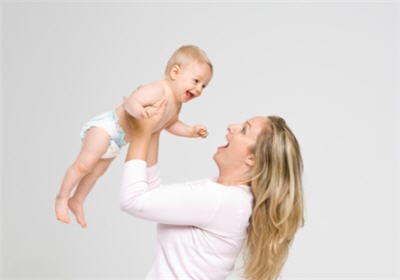Did you know your baby’s social development and attachments to you and others are significant to his communication skills, language development and many other facets of development? It’s so important to provide your baby with an environment rich in nurturing stimuli like some of the suggestions we have listed below:
Newborn to a year…
A newborn (up to the age of three months) loves spending face time with you. Infants this age love looking at the complexities of faces–particularly those they know and love. Talk quietly and often to your little one, as she recognizes your voice and will find comfort in it. Use different voices. Sing, smile and show expression on your face. She will begin to smile and coo, imitating your expressions and facial movements, and will enjoy music. Between four to six months they will begin laughing and will enjoy being read and sang to with even greater excitement. He can tell family members apart from strangers and recognize his parents. He begins to say single-syllable words–language is an important bridge in social development. Seven to nine months will bring lots of excitement as your baby recognizes her name, and can combine syllables ("mama" and "dada"), although she won’t know what they mean just yet. She can understand the word "no" and will respond to simple verbal commands. At around seven to eight months your baby will begin to develop stranger anxiety and will dislike you leaving or being left with "strangers." This is a normal, natural phase of development and should be treated as such. In the last months of his first year your little one will love being read to and will follow along with picture stories. He can play simple interactive games like pat-a-cake and peek-a-boo–play often to his delight! He will love imitating animal sounds and can understand several words as his spoken vocabulary also increases. He’ll likely cling to his parents (or older siblings) in strange situations and can show affection. Respond in kind–hugging, kissing, snuggling and touching your little one. A wonderful idea: Take pictures and make a family album to show your baby all the people in your family. It’s great to give a care-taker too, so that the baby starts to identify who the most important people in her life are.
Answer her cries
One of the best things you can do for your baby is answer her when she cries. Until a baby is around a year old, her cries are not intended to manipulate you into responding how they would like you to. When a baby less than a year cries, it is a method of communication–their only method of communication–and it is very important that you respond to that cry with every effort to comfort her. Babies cry in the beginning because they are hungry, need warmth, are uncomfortable or lonely. Responding quickly to those needs will ensure your little one that you are there to protect her and keep her safe and will actually result in her crying less–as she will have learned that yes, you will be there when she needs you. As your little one ages her cries become ways to communicate other needs–such as venting frustration, sadness or unhappiness. While responding immediately is important in the beginning–as your baby ages it’s important that you respond immediately if your baby is danger but if not you may say, "Oh honey, I know you’re tired. Momma will pick you up as soon as I’m done putting away these dishes."
Play dates!
A baby’s social development, language, vision, hearing and attachments are intertwined. Engaging in activities that promote the use of these skills will benefit your baby and his development on many levels. Expose your little one to many activities and experiences–the park, museums, library, grocery stores and post offices. Take him to the zoo and to visit grandma, walk in the woods and to play dates.
Are you concerned?
If you are concerned about your baby’s social development and attachments, contact your pediatrician. Most of the time, social delays can be purely that–social delays–they may also be indicative of other problems such as vision or hearing impairment, emotional or intellectual delay. Many times these delays, when identified, can be managed with treatments and therapies that will correct or inhibit further delay.





